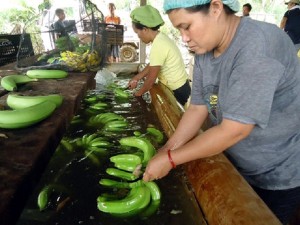The Philippines and United States governments are working on a bilateral agreement on agricultural produce after a go-signal was given to export volumes of local bananas to the American market.
“The final stage is the bilateral signing between the governments to formalize our export of bananas to the United States,” said Clarito Barron, director of the Department of Agriculture-Bureau of Plant Industry.
The new export market for Philippine bananas, one of the country’s top dollar earners, was confirmed recently by Agriculture Secretary Proceso Alcala. According to Alcala, the phytosanitary check of the crop has been completed and the parties have been discussing the logistics of the export process.
The government has directed the agriculture department to eye new markets for the local crop after the Chinese government recently blocked the entry of Philippine bananas to their market over concerns of pest contamination.
Barron said he hoped the Philippines would be able to export bananas to the US mainland and territories “within the year.” If the deal pushes through, this would be the first time that local bananas will be sold in the United States.
In exchange for the US allowing the entry of local bananas to its market, the United States wants the Philippines to allow the importation of more American potatoes and vegetables, Barron said.
According to the agriculture official, importers of American-farmed vegetables bring in minimal amounts of produce—between 250 and 500 kilos—to the Philippines. The vegetables are usually intended for high-end clients like hotels and restaurants, he said.
“We are asking that our bananas be sent to them. They are asking us to import potatoes and semi-temperate vegetables like carrots, broccoli, cauliflower… they would like to increase the volume, not only for the high-end consumers but for the whole market,” he said.
Barron said both countries were still in the middle of discussions on pest risk analysis of the banana crops.
Barron said the Philippines also has to convince the United States that it would follow strict plant quarantine protocols for its crops. After this, officials of both countries will set up talks with the stakeholders in the US market, he said.
“Hopefully, if there are no problems this year, the US government will be opening up their market to our bananas,” he said.
Negotiations between the two countries on the export of fresh bananas to the mainland, which started in December 2005, were stalled due to quarantine and phytosanitary issues.
Meanwhile, Barron revealed that the Philippines is eyeing new markets for its tropical fruits, even as it has started reaching out to 13 countries.
He said the agriculture department has written letters to countries like Russia, the Netherlands, Indonesia, Egypt, Israel, Jordan and Pakistan to take a look at Philippine bananas. The Philippine government hopes that new markets for the produce would keep the industry afloat after it was hit by the Chinese embargo and strict quarantine protocols.
